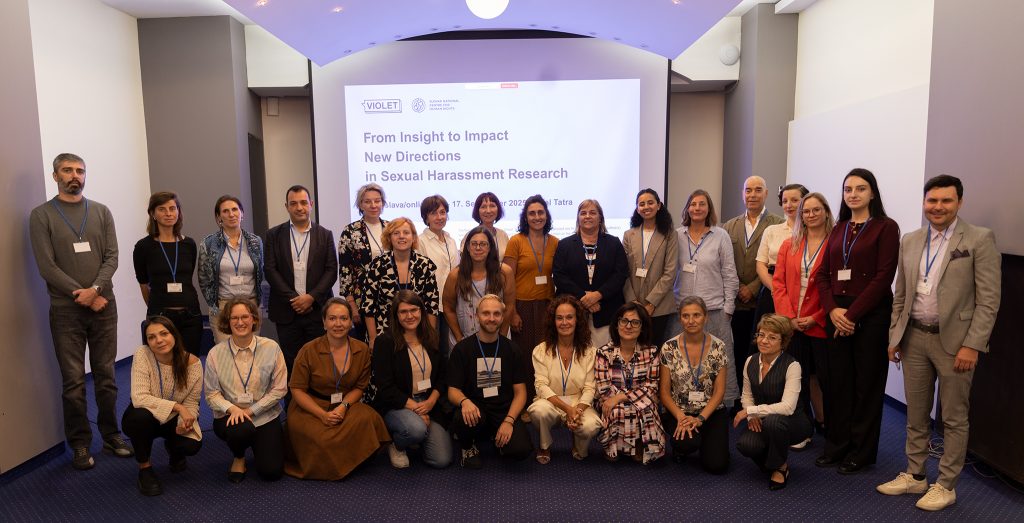Expert Seminar VIOLET on Research into Sexual Harassment and Violence in the Workplace
Among the tasks of equality bodies are monitoring the occurrence of sexual harassment incidents, examining risk factors and barriers to reporting, and formulating recommendations to enhance workplace safety. The Slovak National Center for Human Rights has long addressed this issue, and through an international project, we organized an expert seminar to gather recommendations on data collection related to sexual harassment for informing future policy advice.
The event brought together experts from research institutions, equality bodies, and NGOs advocating for women’s rights. Thanks to the participation of representatives from various European countries (Portugal, France, the Czech Republic, Latvia, Lithuania, Albania, North Macedonia, and Bulgaria), it was possible to identify not only common European legal frameworks but also differences related to the (non-)ratification of the Istanbul Convention or the ILO Convention on the Elimination of Violence and Harassment in the workplace.
The seminar was opened by Sylvia Porubänová, the Executive Director of the Slovak National Centre for Human Rights, who highlighted the importance of accessible data for advocating better policies. The presentation of findings from the international EU-GBV data collection—conducted jointly by EUROSTAT, FRA, and EIGE—and the subsequent discussion with experts Eva-Esther Sobotka (FRA) and Alexandrina Santonai (EIGE) helped to better identify issues that remain unmapped and sectors of the economy that may have varying prevalence rates.
Marta Pompili, representing Equinet, the European Network of Equality Bodies, discussed the relevant European legislation that research on sexual harassment (not only within the VIOLET project) should be based on. She emphasized the importance of comparable data for policymaking and targeted recommendations. Litigation practices can also serve as a source for defining sexual harassment as a research subject. From this perspective, independent expert Margarita S. Ilieva guided participants through case studies of judgments from the European Court of Human Rights.
The seminar also offered a space for sharing experiences from implementing international research projects (such as UNISafe, Decent Work Questionnaire, Sexual Harassment at the Workplace) focused on sexual harassment, along with recommendations related to methodological choices, ensuring data comparability, and operationalizing sexual harassment across different dimensions.
Research planned within the VIOLET project will build on previous studies conducted by several partner organizations. Presentations from Latvia, Portugal, Albania, and Slovakia helped map diverse approaches to empirically studying experiences of sexual harassment at workplaces, as well as similarities in prevalence rates and underreporting.
The seminar facilitated the sharing of experiences and suggestions for designing the methodological framework of research tasks. The discussions produced several key insights:
- Sexual harassment is defined by several legal frameworks (e.g., the Istanbul Convention) as a form of violence against women. However, expanding the research focus to include the entire population may help better understand the gendered nature of sexual harassment. Such data are currently not available through the EU-GBV survey.
- Using an intersectional approach can add significant value to research focused on specific economic sectors. According to previous studies, key variables might include the type of employment relationship, language, disability, nationality (labour migration), ethnic or minority status, and social class.
- Sector-specific information on barriers to reporting and how reported cases are handled in workplaces is crucial for developing recommendations.
- For systemic prevention, gaining deeper insights into how sexual harassment affects victims and the level of public awareness would be beneficial.
- Findings about the power dynamics between perpetrators and victims—whether harassment more often comes from superiors or peers—could also be relevant, as well as exploring the impact of gender diversity in the workplace.
The VIOLET project expert group will build on the recommendations collected during the seminar in preparing the questionnaire for the planned survey and other project outputs.

Co-funded by the European Union. Views and opinions expressed are however those of the author(s) only and do not necessarily reflect those of the European Union or the European Commission. Neither the European Union nor the European Commission can be held responsible for them.








